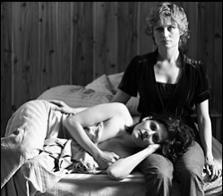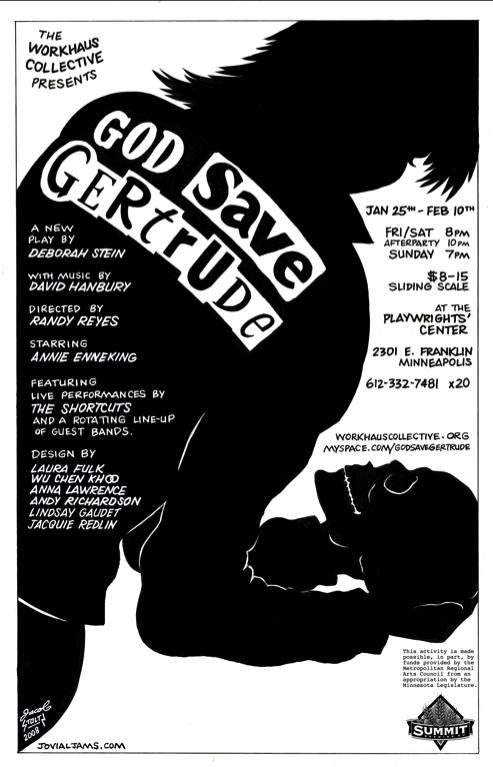Playwrights Play House. Seriously.
Actor Marc Halsey goes behind the scenes at the Workhaus Collective, a recently formed playwright-driven theater company which is also the 2007-2008 Company In Residence at the Playwrights' Center.



WHEN A GROUP OF PLAYWRIGHTS CAME TOGETHER in the spring of 2005 to form a new Twin Cities theater company called Workhaus Collective, they had a question in mind: What if playwrights controlled how plays get produced?
Rarely are playwrights intimately involved in the process of producing their plays. It’s a reality Workhaus Collective’s Co-Artistic Director Deborah Stein finds regrettable. “The play is not just the words on the page,” she says. “It’s all the stuff together.” Stein is a self-described “theater maker” who likes to be fully involved in bringing her stories to life. For her, that requires a hands-on approach.
Workhaus Collective, the newly formed playwright-driven theater company Stein joined last year, aspires to give her exactly what she’s looking for–a way to get her work in front of an audience and a chance to see her play produced the way she, the playwright, envisions it.
Every year dozens of playwrights from across the country pass through Minneapolis, often via the Playwrights’ Center, for readings, workshops, and the prized Jerome Fellowships that annually bring five emerging writers to Minnesota for an entire year. Sometimes playwrights stay—as did Allison Moore, Christina Hamm, and, for a time, Carlyle Brown. More often than not, however, playwrights leave when their time is up.
But with the arrival of Workhaus on the Twin Cities theater scene, some think the tide may be changing—and for good reason. Stein is among them. “It’s like heaven for playwrights here,” she observes. Her play, God Save Gertrude, a punk rock riff on Hamlet, runs at The Playwrights’ Center through this Sunday. It’s the second Workhaus Collective production in their inaugural season, and the third in the new company’s history.
Stein’s production is just one sign of deepening of roots for a handful of playwrights in the Twin Cities. No question, the Twin Cities has long touted proudly its reputation for theater arts. The audiences are thirsty, and the performers aren’t always starving. Minnesota Monthly’s 2008 Salary Survey “Who Makes What,” found Minnesota actors make two dollars over the national average. In addition to a lively arts scene that provides a built-in community for creativity, the Twin Cities has other amenities that increasingly attract playwrights to stick around.
“It’s a Mecca,” says Playwrights’ Center Artistic Associate Hayley Finn, who jokes with friends that Minneapolis is “sort of how Paris was at one point.” In large part, Finn thinks the affordable living here is a big draw. Stein agrees that the creative scene and cost-of-living are attractive, but she emphasizes that there’s also something artistically inviting about this particular theater community that attracts emerging playwrights. “I can be an experimental playwright here without feeling like I am on the fringe,” she says.
Matthew Everett, a fellow playwright and Minnesota transplant, agrees. “There are a lot of Minnesota actors and directors who love cutting their teeth at new work,” he says. Gathering a group of actors to read his latest draft usually comes easily for Everett, something he takes as a sign of the acting and directing community’s deep interest in creating new plays. “I know they don’t come for the snacks. We don’t put out that good a spread.”
A three-time Minnesota State Arts Board grant recipient, Everett first came to the Twin Cities after graduating from the Yale of School of Drama in 1991. Drawn by resources like The Playwrights’ Center, The Loft Literary Center, and the Screenwriters Workshop, as well as the grant and funding opportunities, he sees Minnesota as a place you can not only survive as a writer but live.
“It’s great to have that community of people to bounce ideas off,” says current Jerome Fellow and Workhaus Collective playwright Cory Hinkle. Originally from Iowa, Hinkle was brought to Minnesota by the Jerome Fellowship and, like a growing number of his fellow writers, says he plans to stay when it’s done—though he’s not sure for how long.
Playwrights have become an increasingly nomadic breed. They traverse the country from readings to workshops to productions of their work. “As the regional scene has become stronger, more and more playwrights don’t need to be in New York,” says Hinkle.
With a steadily flourishing group of new small theater companies in the Twin Cities, carving out a distinctive niche presents an interesting challenge for the Workhaus playwrights—but one that they seem particularly well-suited for. “They’re not writing what people typically think the theater will be,” says Hinkle of his fellow Workhaus playwrights. He cites the group’s current production of Stein’s God Save Gertrude as a perfect example. “Throwing together a classic text and punk rock music, that’s just an awesome idea.”
Yet in the past, Hinkle says, many writers coming to Minnesota have seen their plays produced more often out-of-town than here at home. It may be another reason behind the formation of Workhaus. “The feeling was [the Jerome Fellows] were here developing our work at The Playwrights’ Center and having different things going all over the country,” Hinkle explains. “But there weren’t a lot of productions happening here in Minneapolis.”
Even with so many small Twin Cities theater companies, many of whom stage new work, Hinkle sees major obstacles to establishing a lasting presence here. “There’s a lack of mid-sized theater companies here that can attract a large audience to new plays.” He cites the Jungle and Guthrie as examples of companies that can draw large audiences to new work but which, generally, produce new plays with at least one major production behind them. “In Chicago, you can start a theater company and in five years you can generate an audience. That seems to be a lot harder here,” he says.
Despite impediments, Workhaus Collective hopes they’re here to stay. With two productions under their belt, a third one ready to open, and the emphatic support of Polly Carl and The Playwrights’ Center, Workhaus is likely to be here for at least the next few years. And that’s how far they’ve scheduled plays. By 2010 each playwrights in the collective will have seen one of their plays produced.
What will happen after 2010?
“That’s so far off,” says Hinkle, who’s currently busy working on his play SadGrrl13. His play is the next one slated to go up at the Playwrights’ Center this summer. He describes SadGrrl13 (set to open June 6) as a collision of Jacobean drama, contemporary visual art and transcripts from Internet chat rooms. It’s a work that sprung from NBC Dateline’s popular program, To Catch a Predator, and a graduate school class he took with Paula Vogel. And, like Stein, Hinkle will become the Artistic Director of Workhaus Collective when his play goes into production–making him both playwright and producer.
Michael Dixon, Resident Director of the Ruth Easton Lab at The Playwrights’ Center, notes the larger growth of the playwright-producer model nationwide and the enrichment it can bring. “When playwrights become producers of their own works, they embrace the importance of the audience in the realization of their artistic expression, which bodes well for the audience experience of their plays.”
Whether the new Workhaus Collective marks a trend for more playwrights planting roots in Minnesota remains to be seen. While many playwrights are optimistic, Hinkle sees little reason to think much will change.
“Most come here as emerging playwrights; spend one, two, three, or four years here and then go on to New York or LA.” With enticing offerings like Workhaus Collective, perhaps Minneapolis will be able to keep a few more playwrights at home for the cold months. Adding to its collection—at least until the snow thaws.
* * *
The Workhaus Collective includes Janet Allard, Trista Baldwin, Alan M. Berks, Kimberly Burke, Jeanine Coulombe, Cory Hinkle, and Carson Kreitzer, Dominic Orlando, Deborah Stein, and Victoria Stewart. Previous productions included Trista Baldwin’s Doe and Dominic Orlando’s A Short Play About Globalization.
About the writer: Marc Halsey is an actor and writer. He will appear in Ten Thousand Things’ upcoming production of Sarah Ruhl’s Eurydice.